- Te Pāti Māori urges vigilance after the Treaty Principles Bill was voted down, calling it “one battle won”.
- David Seymour remains defiant, exploring options to keep the bill’s vision alive before the next election.
- All parties except Act voted against the bill, with eleven votes in favour and 112 against.
Te Pāti Māori is urging people to remain vigilant for other Government policies it believes are harmful, saying Thursday’s voting down of the Treaty Principles Bill is only “one battle won”.
The bill’s architect David Seymour said there will be more to come in this space as the Act Party considers its options before the next general election to keep the vision behind the controversial bill alive.
Te Pāti Māori co-leader Debbie Ngarewa-Packer said, “we have spent the last year and a half in defence mode”.
“What we would like to do now, aside as tangata whenua, tangta Tiriti, is focus on ... what it is we need to do to not only protect Te Tiriti but to entrench, to make sure the rest of the nation enjoy learning [about] the absolute taonga [treasure] we have in Te Tiriti.”
The party’s other co-leader Rawiri Waititi said more needed to be done to increase education around Te Titiri before a national conversation or any referendum on such an issue was held.
“If we are going to have a conversation, let’s make sure we have an informed conversation, get educated and ensure people have access to the education so we can have a conversation.
“If it goes to a referendum, at least everybody is informed and knows what they are talking about. The country is not ready for that because I believe we have not had the education everybody deserves to have.”
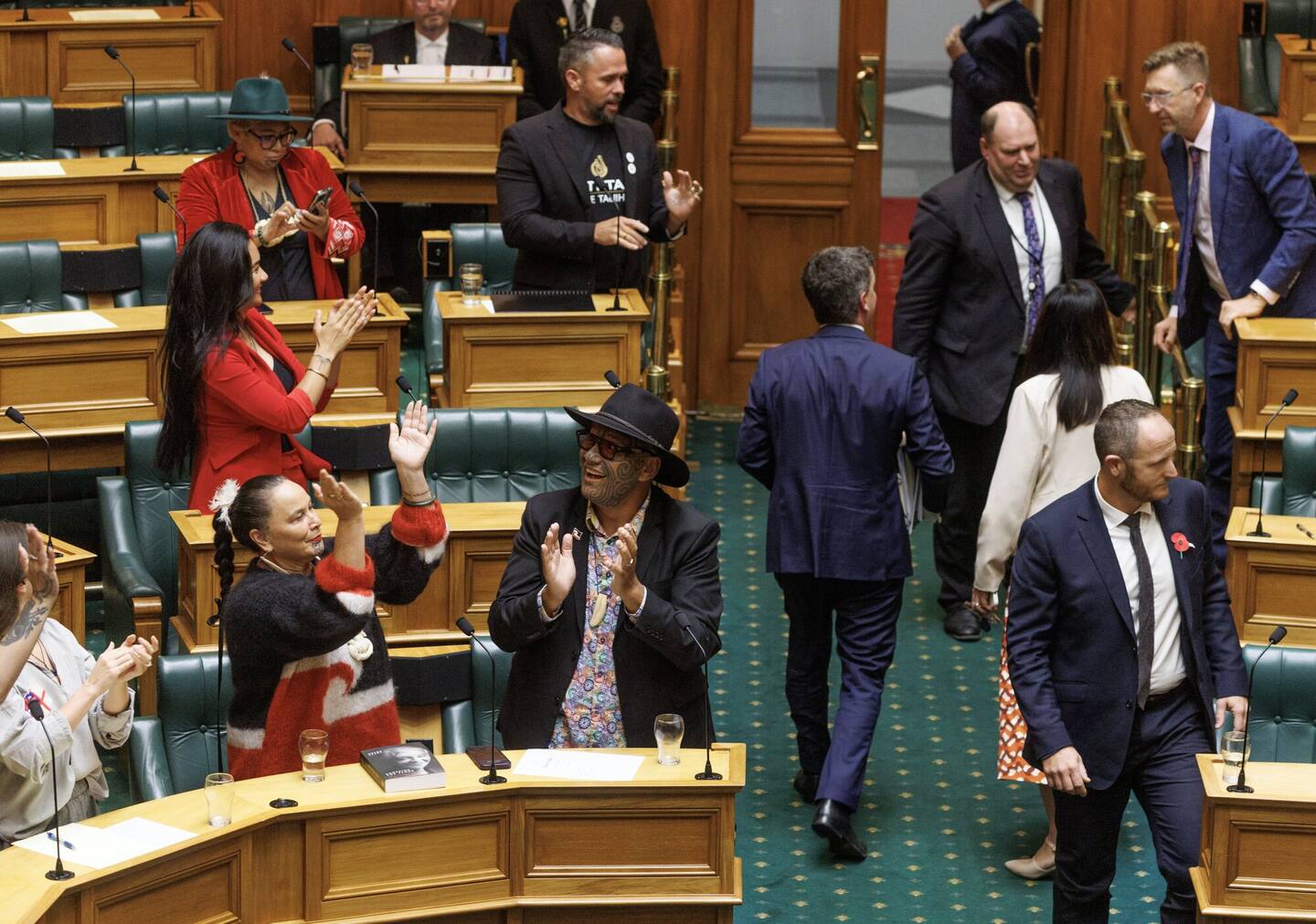 Opposition MPs celebrate as Act leader David Seymour leaves the House after the Treaty Principles Bill was voted down. Photo / Mark Mitchell
Opposition MPs celebrate as Act leader David Seymour leaves the House after the Treaty Principles Bill was voted down. Photo / Mark Mitchell
It was a raucous and passionate second reading of the Treaty Principles Bill. Te Pāti Māori’s Hana-Rāwhiti Maipi-Clarke sang, Labour’s Willie Jackson was kicked out of the House for once again calling Seymour a liar and a member of the public did a haka from the gallery.
The volatility of the House during the second reading was typical of the bill’s whole process. Speaker of the House Gerry Brownlee came close to clearing the public gallery and ejecting heckling MPs as his patience for those flouting his orders ran thin.
The Opposition took aim at National and NZ First for not doing more to stop the Treaty Principles Bill, which Labour’s Chris Hipkins said had a “colossal” impact on society and will forever be a stain on New Zealand.
“This is a grubby little bill, born of a grubby little deal,” Hipkins said.
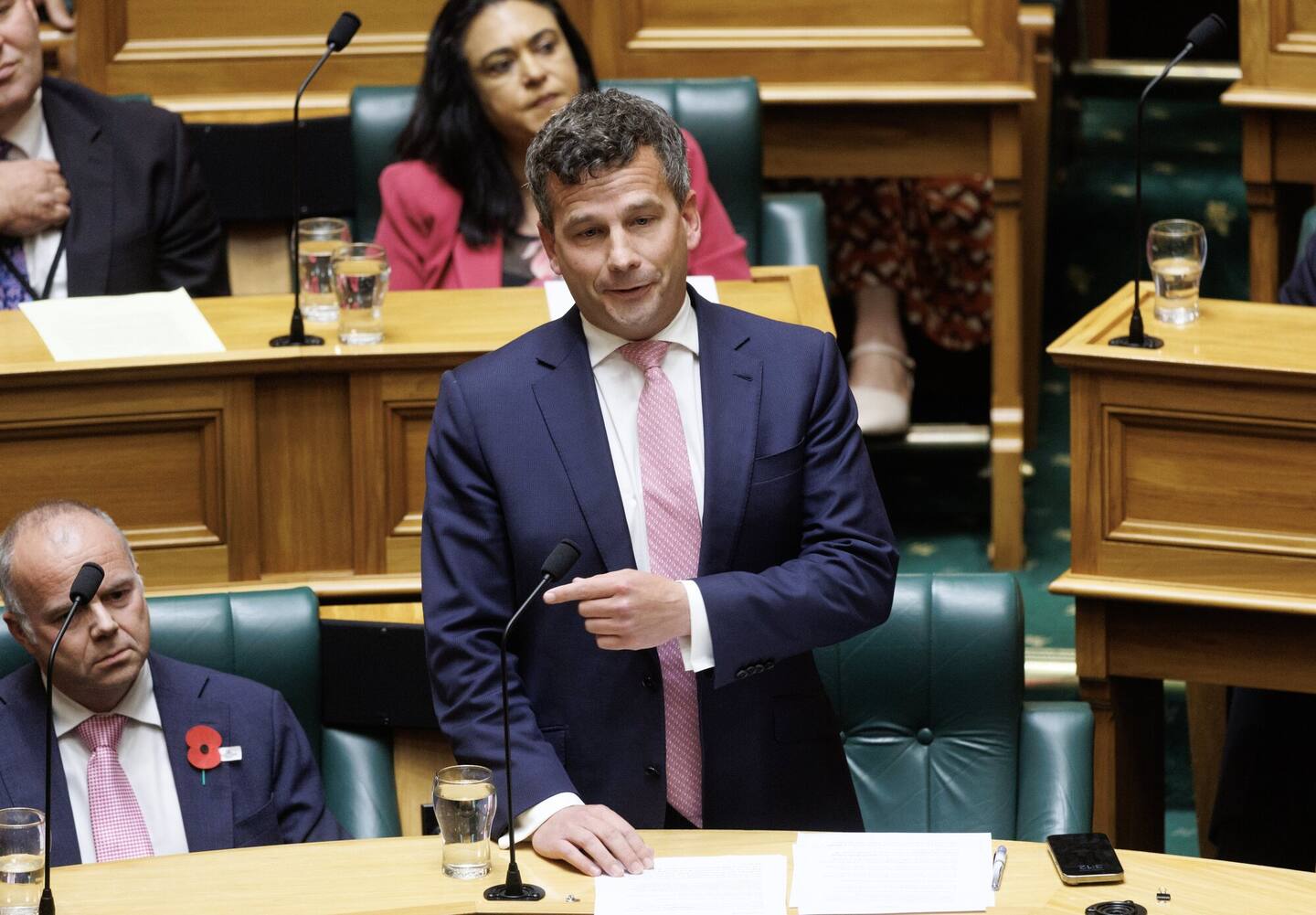 Act leader David Seymour during the second reading of the Treaty Principles Bill. Photo / Mark Mitchell
Act leader David Seymour during the second reading of the Treaty Principles Bill. Photo / Mark Mitchell
“National and New Zealand First join the opposition to this bill, but they can claim no victory, no virtue, and no principle. They get no credit for finally starting to fight the fire they helped to ignite.”
Treaty Negotiations Minister Paul Goldsmith defended the Government’s position, saying neither National or Act got what they wanted from their coalition agreement on the issue and “that is life under MMP [the voting system].”
“Our country is not so fragile that we can’t withstand a debate about the role of the Treaty. National opposes this bill but we do not oppose the open and frank discussion about the role of the Treaty of Waitangi in our laws and within the context of a modern democracy.”
Goldsmith acknowledged those who had made the effort to submit to the Justice Select Committee, saying some of those submissions were “truly remarkable”.
During his address, Seymour said his bill would have finally defined the principles to give “all Kiwis equal rights” if it had become law. He used his address to remind MPs they could still change their minds and send the bill to a referendum.
In the end, all political parties except Act voted against the bill with 11 votes in favour and 112 against. This outcome was expected as National and NZ First had said in the lead up to the second reading they would vote against it.
But Seymour remained defiant, refusing to concede the bill had failed and indicating he is considering different options to try to keep his vision alive.
“For the purposes of this conversation, putting the same thing right back is a possibility, amending another law is a possibility. There are lots of options,” he told reporters outside the debating chamber.
More details about what Act plan to propose next would be revealed before the next general election, he said.
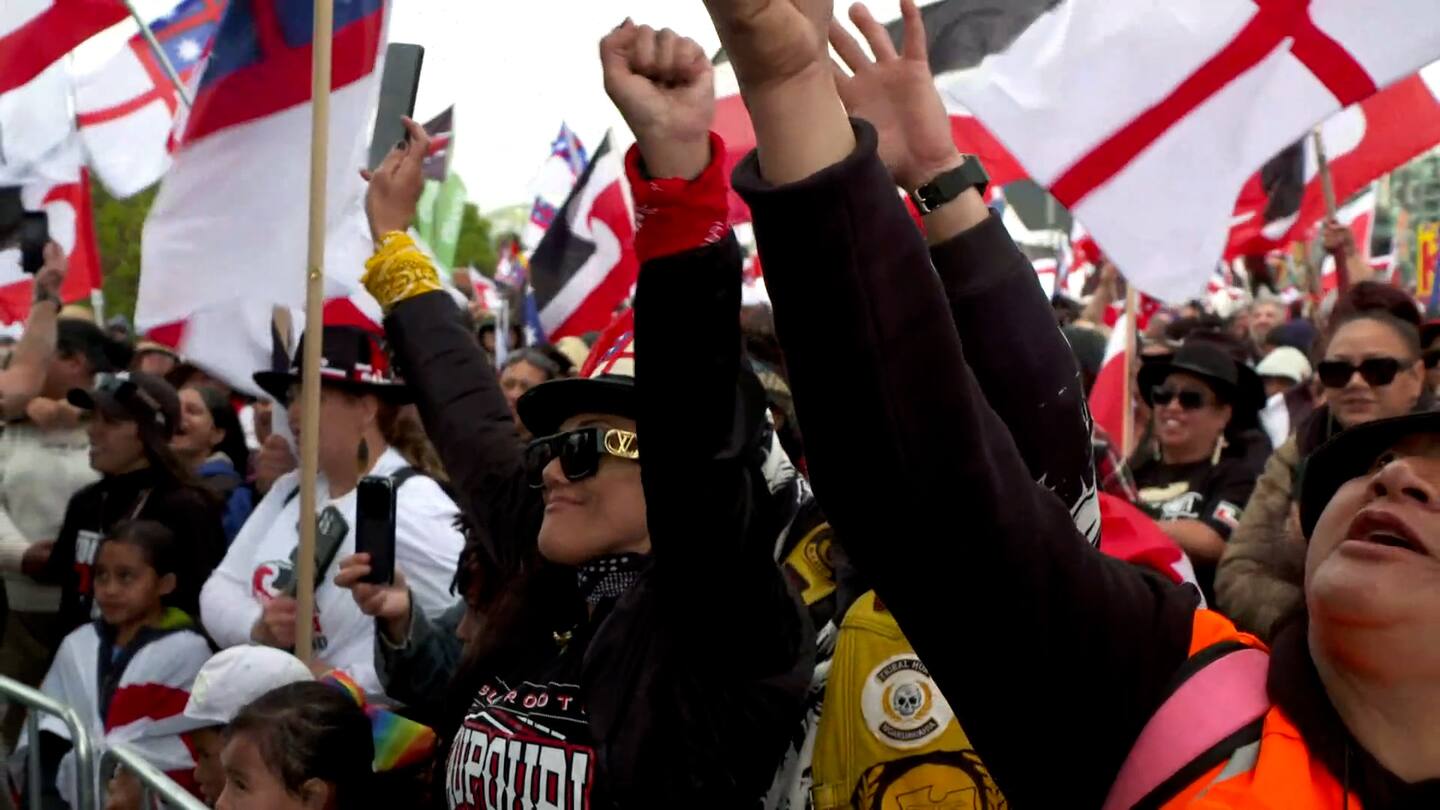 Hikoi mo te Tiriti marches through Wellington to reach Parliament. Photo / NZME
Hikoi mo te Tiriti marches through Wellington to reach Parliament. Photo / NZME
“We realise people probably want to focus on a few other things but they will come back to this issue because it is one of the defining issues of New Zealand. Does our Treaty unite us with equal rights, or divide us, as partnership between races? That question hasn’t gone away.”
Meanwhile, Te Pāti Māori and other critics of the Treaty Principles Bill are celebrating the end to what they have called a long and exhausting campaign. Opposition MPs stood up and cheered as the final vote was announced.
“This campaign that iwi had to drive has been exhausting, it’s been unnecessary but it has also been a great time for us as Te Pāti Māori to reflect on what it is we have learnt from this as we determine as a nation what we do next,” Ngarewa-Packer said.
While the first reading was “deeply painful and traumatic”, the second was a celebration, she said
In her address to the House, Hana-Rāwhiti Maipi-Clarke of Te Pāti Māori said the real issue was not the bill but that Parliament had only ever recognised “one partner, one culture, one language from one Treaty”.
She urged Parliament to acknowledge tikanga and te tiriti o Waitangi.
“That is the real question of privilege here. At our darkest hour we could have chosen to fight this, but we chose to survive this. This bill hasn’t been stopped, this bill has been absolutely annihilated.”
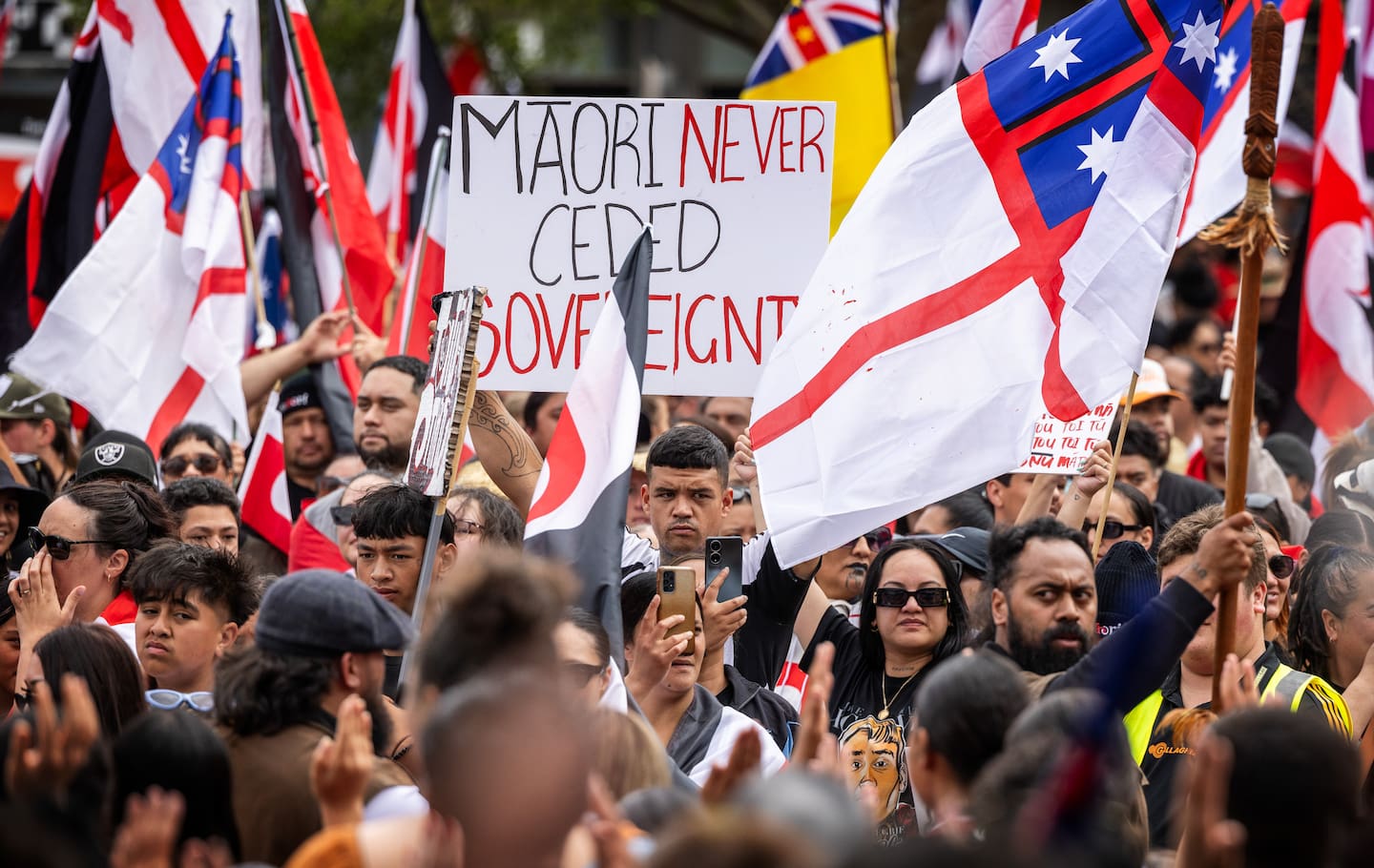 Hīkoi participants march in Hamilton on day four of a journey to Wellington to protest various issues impacting Māori. Photo / Mike Scott
Hīkoi participants march in Hamilton on day four of a journey to Wellington to protest various issues impacting Māori. Photo / Mike Scott
The Treaty Principles Bill through the years
March 24, 2022: Act announces referendum campaign
Act announces it will campaign for a referendum on Māori co-governance and for legislation defining the Principles of the Treaty, in particular their effect on democratic institutions. Seymour tells 1News the issue would be a bottom line if forming a Government.
November 25, 2023: Coalition agreements revealed
The coalition agreements between National, Act and NZ First are unveiled. In them, National and NZ First agree to support a Treaty Principles Bill based on existing Act policy to the select committee stage, but no further.
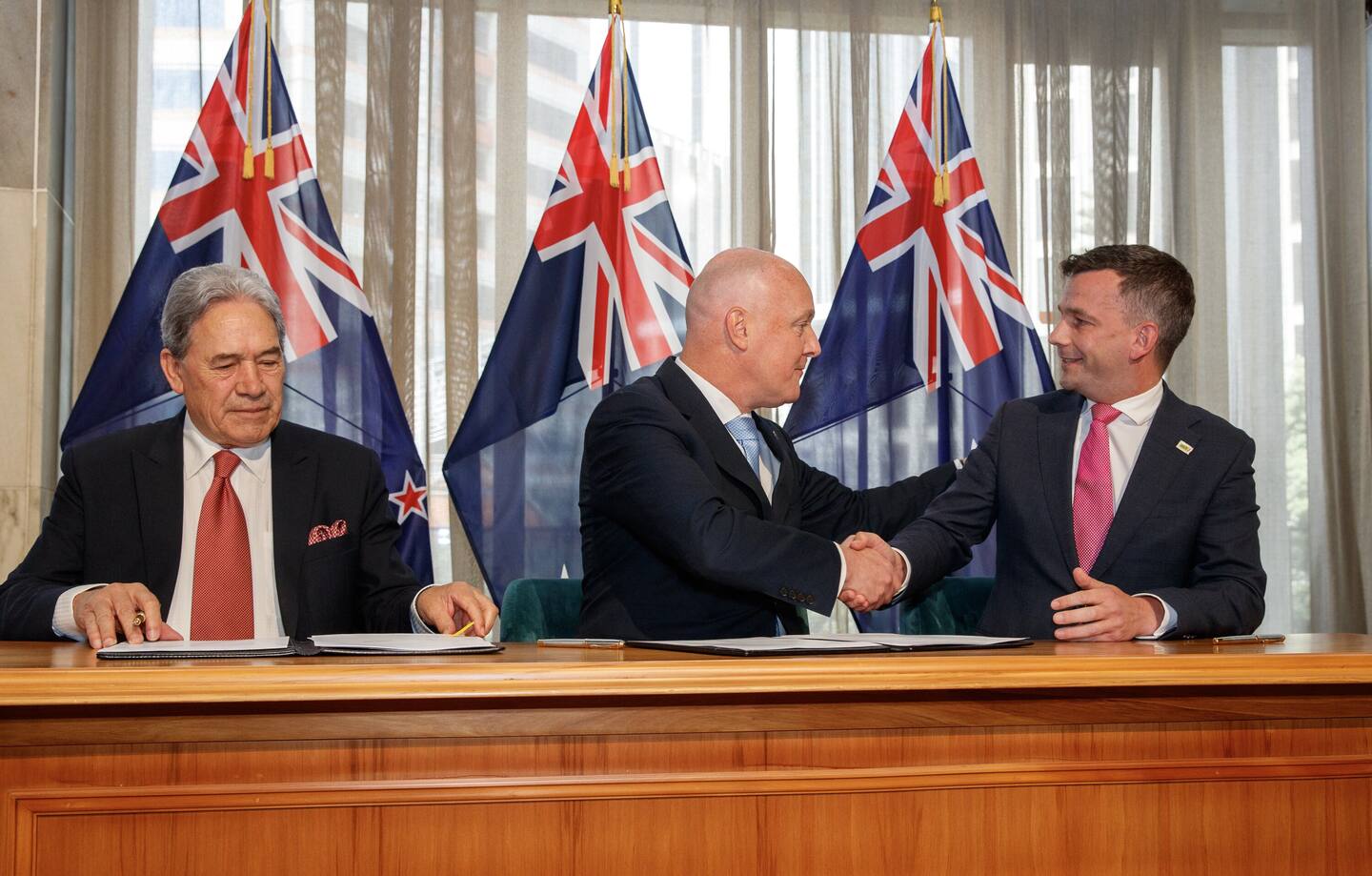 NZ First leader Winston Peters, National leader Christopher Luxon and Act leader David Seymour after signing their coalition agreement. Photo / Mark Mitchell
NZ First leader Winston Peters, National leader Christopher Luxon and Act leader David Seymour after signing their coalition agreement. Photo / Mark Mitchell
August 16, 2024: Scathing Waitangi Tribunal report released
A 189-page Waitangi Tribunal report describes the bill as unfair, discriminatory and “a solution to a problem that does not exist”.
September 9, 2024: 400 church leaders condemn bill
More than 400 church leaders – including all three Anglican archbishops, the Catholic Archbishop and a Catholic Cardinal, the Methodist Church president and the Salvation Army commissioner – sign an open letter to MPs calling on them to vote down the Treaty Principles Bill.
September 11, 2024: Cabinet agrees on principles
The principles agreed on by Cabinet are released. They are:
1) Civil Government: The Government of New Zealand has full power to govern, and Parliament has full power to make laws. They do so in the best interests of everyone, and in accordance with the rule of law and the maintenance of a free and democratic society.
2) Rights of hapū and iwi Māori: The Crown recognises the rights that hapū and iwi had when they signed the Treaty. The Crown will respect and protect those rights. Those rights differ from the rights everyone has a reasonable expectation to enjoy only when they are specified in legislation, Treaty settlements, or other agreements with the Crown.
3) Right to equality: Everyone is equal before the law and is entitled to the equal protection and equal benefit of the law without discrimination. Everyone is entitled to the equal enjoyment of the same fundamental human rights without discrimination.
October 8, 2024: Seymour debates iwi leader Helmut Modlik
Seymour takes part in his first public debate on the Treaty Principles Bill, going head-to-head with Helmut Modlik, tumu Whakarae (chief executive) of Te Rūnanga o Toa Rangatira.
November 14, 2024: First reading & the world-famous haka
Labour MP Willie Jackson is sent out of the House during the first reading for the Treaty Principles Bill. Voting on the bill is interrupted by a Te Pāti Māori-led haka, which was viewed hundreds of millions of times on social media. Several Government MPs complained about it and Brownlee [Speaker of the House] called it “appalling” and “disrespectful”, deeming such pre-meditated behaviour as “grossly disorderly”.
November 18, 2024: Historic hīkoi arrives at Parliament
Tens of thousands of people descend on Wellington in a historic day of mass protest. People are protesting Government policies they consider to be anti-Māori, including the Treaty Principles Bill
January 24, 2025: Winston Peters says bill ‘dead in the water’
NZ First leader Winston Peters says at Rātana the bill is “dead in the water”. Prime Minister Christopher Luxon tries to reassure those gathered that the bill “will not become law”.
January 27, 2025: Oral submissions begin
Seymour kicks off oral submissions before Parliament’s Justice Select Committee. He tells the committee he believes the Treaty Principles Bill, or a bill similar to it, will eventually pass at some point in the future.
“What we have witnessed in recent decades is how the courts and the Waitangi Tribunal have sought to define the principles of the Treaty is incompatible with freedom under the law, a free society, where each of us have equal rights.”
 The Hīkoi mō te Tiriti outside Parliament in Wellington in November 2024. Photo / Mark Mitchell
The Hīkoi mō te Tiriti outside Parliament in Wellington in November 2024. Photo / Mark Mitchell
April 4, 2025: Justice Select Committee releases report
Report states committee received more than 300,000 written submissions and requests for 16,000 oral submissions. Of the written submissions, 90% opposed the legislation, 8% were in support and 2% had not clearly stated their position. Of the oral submissions, 85% were opposed, 10% were in support and 5% were unstated.
April 10, 2025: Second and final reading
All political parties except Act vote against the bill with 11 votes in favour and 112 against.
Julia Gabel is a Wellington-based political reporter. She joined the Herald in 2020 and has most recently focused on data journalism.
Take your Radio, Podcasts and Music with you









